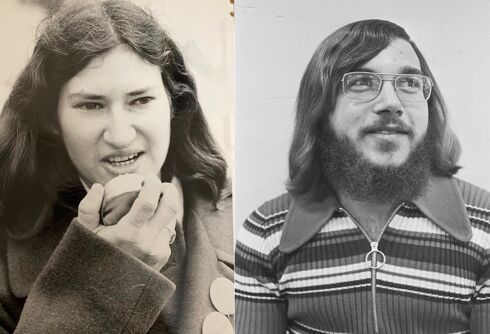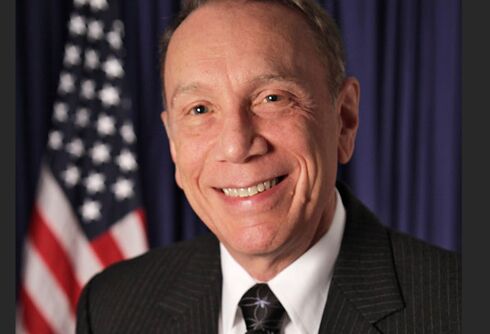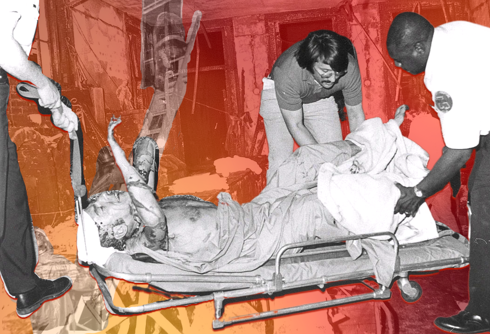The sit-in at Dewey’s, which occurred at a Philadelphia restaurant in the spring of 1965, is not as well-known as the Stonewall Riots, but it deserves wider recognition.
On the evening of Sunday, April 25, 1965, staff at the diner turned away more than 150 people they believed to be LGBT. According to the August 1965 issue of Drum magazine, which mixed beefcake pictorials with news for gay men, the restaurant’s staff refused “to serve a large number of homosexuals and persons wearing non-conformist clothing.”
Eventually, three teenagers — two boys and one girl — refused to give up their seats, in effect beginning a sit-in. In the week that followed, LGBT activists used tactics borrowed from the civil-rights movement to put pressure on the restaurant’s owners until the ban was lifted.
On closer examination, the sit-in at Dewey’s suggests that gay militancy began at least a few years before Stonewall. It also hearkens back to a time when gays, lesbians and transgender people clearly saw their struggles as intertwined.
Never Miss a Beat
Subscribe to our newsletter to stay ahead of the latest LGBTQ+ political news and insights.
For Marc Stein, a professor of history at San Francisco State University, the sit-in at Dewey’s not only adds to our knowledge of the past, it also prompts us to reevaluate our current understanding of LGBT history.
“I think one of the important things to see is that there was a history of these episodes for at least five years before the Stonewall Riots,” Stein said during a telephone interview.
“I think for a lot of us,” he continued, “if there’s one thing we want to challenge, it’s the notion that the movement began at Stonewall or the notion that Stonewall was the first time that gays and lesbians, that LGBT people, fought back.”
The story of the sit-in at Dewey’s may very well have been forgotten if it were not for Stein. The mainstream media ignored the incident then and it received scant attention from scholars before Stein began his research. Fortunately, a handful of men and women mentioned the restaurant to the historian while he was interviewing them for his book, City of Sisterly and Brotherly Loves: Lesbian and Gay Philadelphia, 1945-72.
The Story
Dewey’s was a small, family-owned chain of diners that operated in Philadelphia from the 1940s to the 1970s. When the chain’s owner, Farrel Yesner, passed away in 2003, his obituary stated that “Dewey’s doled out tasty comfort food to customers at restaurants that were mostly old-fashioned lunch counters.”
The all-night eateries served customers from all walks of life, but its 13th Street and 17th Street locations drew many LGBT customers, especially after the bars closed. According to Laurie Barron, one of Stein’s interviewees, the restaurant was known as “Fag Dewey’s.” And another, Joan Fleischmann, told him that at Dewey’s “you’d find streetwalkers, you’d find drag queens, you would find everybody.”
Why things came to a head on Sunday, April 25, 1965 is unclear. The June 1965 newsletter of the Janus Society, the local homophile organization, indicates that the diner’s management had grown tired of a group of young LGBT kids just sitting around, being rowdy and ordering little, so it encouraged its employees to shoo them away.
As Stein put it, “What I do know is that in the months or years leading up to the Dewey’s sit-in, that Dewey’s had become a late-night hangout, especially for young people and for lots of people we would now call trans.”
That night, staff interpreted the directive zealously. Eventually, three teens refused to budge, the police were called and so was Clark Polak, a local LGBT businessman and advocate. At the time, Polak was head of the Janus Society and also published Drum magazine.
Exactly what Polak did that night is unknown. The businessman claimed that he was advising the teens of their rights, but Stein acknowledges it’s easy to imagine him getting cantankerous.
“We know from other stories that Polak would scream and curse at the police, but he would also argue. He was almost fearless. So I’m sure emotions got intense,” Stein said.
The police promptly arrested Polak and the three teenagers. The savvy businessman quickly organized a picket outside Dewey’s. Roughly 1,500 pieces of literature were distributed to customers and passersby over the next five days.
Finally, on Sunday, May 2, just one week after the initial confrontation, a handful of teenagers began a second sit-in.
The police were once again summoned, but this time they refused to arrest anyone. Both parties spoke to one another, the situation was defused and the restaurant resumed serving LGBT customers.
This was no small victory. Writing in the Janus Society’s May 1965 newsletter, its editor, Barbara Horowitz (who signed her work Barbara Harris), asserted, “There is no reason to assume that this cannot be called a job well done.”
That same editorial also makes it clear that Horowitz, and, by extension, Polak, recognized that what took place was about more than just being able to order a cup of coffee. As Horowitz wrote:
“All too often, there is a tendency to be concerned with the rights of homosexuals as long as they somehow appear to be heterosexual, whatever that is. The masculine woman and the feminine man often are looked down upon by the official policy of homophile organizations, but the Janus Society is concerned with the worth of an individual and the manner in which she or he comports himself.”
That statement suggests that at least some LGBT activists saw the limitations of pursuing a policy of militant respectability, which was, roughly speaking, the notion that straights would accept LGBT people if only LGBT people could demonstrate that they were just like everybody else.
The Legacy
There is still more work to be done regarding Dewey’s. Who were the three teenagers arrested that first evening? Were they the same teenagers who initiated the final night’s sit-in? Who manned the picket lines? Were the people involved in the action radicalized by it? What happened to them as the years passed? These remain unanswered questions.
Perhaps fighting for the opportunity to sit in a diner and order a meal appears trivial, but it is important to remember that the civil-rights movement had already demonstrated that seemingly mundane actions could have profound implications.
Studying the sit-in at Dewey’s, Stein discerns significant implications for our understanding of LGBT history. Later in the 1960s, a new kind of LGBT activism emerged: the gay liberation movement, which was more radical than the earlier homophile movement. For many, Stonewall was the momentous beginning of that next phase of activism, but Stein believes otherwise.
In the sit-in at Dewey’s, he finds evidence of LGBT militancy beginning much earlier than 1969. “The idea of fighting back, the idea of borrowing tactics from the civil-rights movement, that stretches back 20 years before Stonewall,” he said.
As Stein and his fellow LGBT historians do more research, a fuller picture of LGBT life in the decades after World War II is taking shape. The sit-in at Dewey’s, for example, can no longer be dismissed as an isolated, random event, thanks to the work of transgender scholar Susan Stryker.
Her 2005 documentary, Screaming Queens: The Riot at Compton’s Cafeteria, examines a 1966 incident in San Francisco that is strikingly similar to the sit-in at Dewey’s with one difference: at Compton’s, the drag queens literally punched, kicked and scratched to defend themselves.
Obviously, more work must be done. But recognizing the significance of what a ragtag group of LGBT teenagers and the adults who supported them accomplished at Dewey’s is a good first step.
Ray Simon is an editor and freelance writer in Philadelphia. He has written about everything from cryptograms to drag kings and environmental sustainability to video games. This article was first published on Bilerico.















